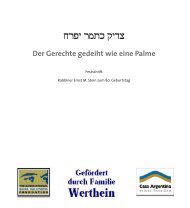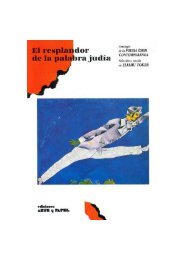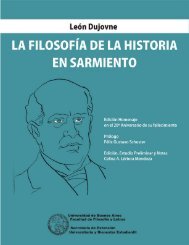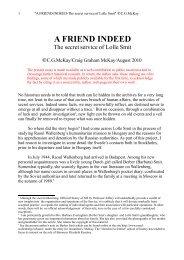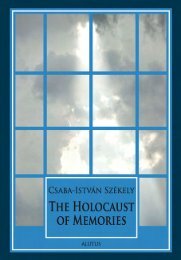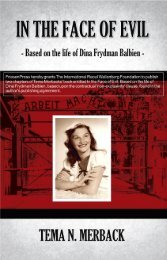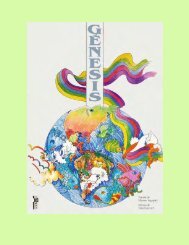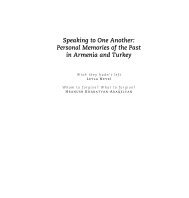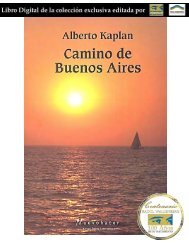We were There - The International Raoul Wallenberg Foundation
We were There - The International Raoul Wallenberg Foundation
We were There - The International Raoul Wallenberg Foundation
Create successful ePaper yourself
Turn your PDF publications into a flip-book with our unique Google optimized e-Paper software.
Ivan Z. Gabor<br />
Echoes of My Footsteps<br />
Excerpt from “Chapter VI: <strong>The</strong> Red Danube” from the book Echoes of My Footsteps. An autobiography by<br />
Ivan Z. Gabor as told to Jeffrey Beal. To read the complete chapter, click here<br />
http://www.raoulwallenberg.net/wp-content/files_flutter/6789.pdf].<br />
…My rescue was due to the intercession of kind strangers. And that obvious principal is nothing more than<br />
random chance. Certainly those people who opened their mouths in my defense <strong>were</strong> noble and good,<br />
and deserved to carry the mantle of true Christendom. But, as far as it related to me, it was blind dumb<br />
luck, something over which I had no control. I got lucky, and that’s all there was to it. Nobody in my<br />
circumstance could claim otherwise. Most Jews who <strong>were</strong> saved from extermination during the war <strong>were</strong><br />
likewise the beneficiaries of mazel, good fortune. It’s true that there <strong>were</strong> some fighters who took<br />
matters into their own hands, and bought their salvation through guts and guile. And there <strong>were</strong> cells of<br />
armed Jewish partisans in the forest, as well as occasional ghetto uprisings, and even a camp revolt. But<br />
the vast majority of Jews <strong>were</strong> emaciated and powerless prisoners, living and dying at the whim of their<br />
captors. <strong>The</strong> rest just hid. Any among those who rode out the storm will be the first to admit that they<br />
only have inexplicable mazel to thank. Relying on fickle and unpredictable luck as a survival plan does not<br />
sound like a prudent tactic, but in retrospect it seemed as if we had little choice. As proof I submit the two<br />
most terrible and traumatic incidents of our lives.<br />
With mere months remaining to the conflict, not that we knew as much at that time, the round up and<br />
deportation of Jews intensified. My grandmother, pregnant mother, and I <strong>were</strong> all living together in one<br />
small apartment in a Jewish designated building, venturing out only for food. After my beating I was more<br />
scared than ever to go out. I was a mass of welts and scars. My eyes <strong>were</strong> both blackened, there <strong>were</strong><br />
cuts along my scalp, and every bone and joint ached. In addition to all that, puss was oozing out of sores<br />
on my neck. By then I had developed a condition, caused by a lack of vitamin D, and it caused running<br />
sores to develop on my neck. Many died from this and other such conditions caused from malnutrition.<br />
<strong>The</strong> war had claimed my body even if death had not yet performed its coup de grace. I almost constantly<br />
felt as I did during my beating. My whole body throbbed. Why couldn’t it just end? <strong>The</strong>n, it almost did.<br />
Had we known how deliciously close the Allies <strong>were</strong> we would’ve been encouraged. But we never heard<br />
any news of the outside world, and confidence eluded us as long as the fascists kept their strangle hold on<br />
the city. <strong>The</strong>y controlled the radio, newspapers, and the posters on the round metal kiosks that dotted<br />
the city. All of this media boasted endless German triumph and served to keep us in fear and anxiety. And<br />
while some Russian artillery units might have been approaching our eastern outskirts the Nazis still held<br />
the population in its grip. Nothing can demonstrate that perfect power more than the mass arrests that<br />
<strong>were</strong> now a daily part of life in the capital, and we felt no surprise when we fell under their shiny cold<br />
boots. <strong>We</strong> accepted it as our inevitable, predetermined fate.<br />
In the early winter of 1944 a mass arrest occurred, and all the inhabitants of our building <strong>were</strong> taken out<br />
and marched toward the ghetto, the next step in our destined deportation to a concentration camp. <strong>The</strong><br />
significance of this was unmistakable. Our turn had finally come. <strong>We</strong> <strong>were</strong> doomed, along with the<br />
countless other Hungarian Jews who had gone this route before. Our entire building was cleared of Jews.<br />
<strong>We</strong> slogged along like zombies, abandoned and alone. <strong><strong>The</strong>re</strong> <strong>were</strong> no Yankee GIs coming to the rescue,<br />
and the Russians <strong>were</strong> just a mirage. All our options <strong>were</strong> closed. <strong>We</strong> <strong>were</strong> dead. But as we marched<br />
toward our black fate a most bizarre and unmistakably surreal event was coming toward us from a<br />
plateau so secret we had no idea it even existed. It came roaring up to us in the form of a shiny black limo.<br />
It caught everyone’s attention equally, brutal tormentors and frightened victims alike. Its brakes squealed<br />
as it careened to a stop, and out jumped a man who then leapt up onto the magical car’s running boards.<br />
As soon as he did he broke out in loud glorious speech.<br />
15



